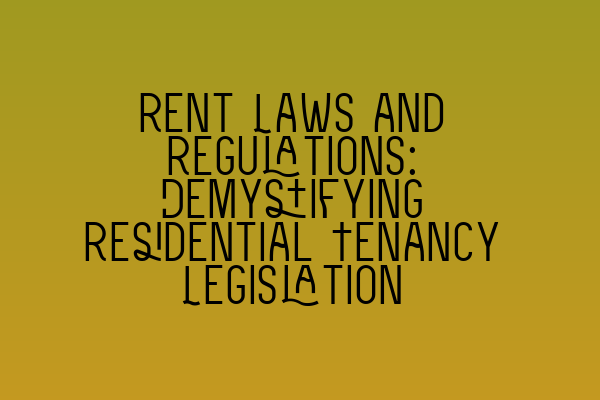Rent Laws and Regulations: Demystifying Residential Tenancy Legislation
As a tenant or landlord, it is crucial to have a solid understanding of the rent laws and regulations that govern residential tenancies. Whether you are renting a property or leasing it out, being well-informed about the legal framework surrounding rental agreements is essential for a smooth and mutually beneficial relationship between all parties involved. In this article, we will demystify residential tenancy legislation, shedding light on key aspects that tenants and landlords should be aware of.
Types of Tenancy Agreements
Before delving into the specifics of rent laws, it is important to understand the different types of tenancy agreements that exist in the UK. The most common types include:
- Assured Shorthold Tenancy (AST): This is the most common form of tenancy agreement, typically used for private rentals. It provides tenants with a minimum term of six months, and the landlord has the right to possess the property at the end of the term, as long as the proper notice is given.
- Assured Tenancy: Assured tenancies offer tenants more security, as they allow for long-term tenancies with no fixed end date. The landlord can only regain possession of the property under specific circumstances outlined in the tenancy agreement.
- Regulated Tenancy: Regulated tenancies are often associated with older properties, and tenants have more rights and protections compared to other types of tenancy agreements.
Understanding the type of tenancy agreement you have or are considering entering into is the first step in navigating the intricacies of rent laws and regulations.
Renting Rights and Responsibilities
Tenants have certain rights and responsibilities that are protected by law. Familiarizing yourself with these rights and responsibilities is crucial to ensure that you are treated fairly and that you comply with your legal obligations as a tenant.
For example, tenants have the right to live in a safe and well-maintained property. Landlords are responsible for providing necessary repairs and maintenance, ensuring the property meets relevant safety standards, and protecting the tenant’s deposit in a government-approved tenancy deposit scheme.
On the other hand, tenants are responsible for paying rent on time, keeping the property clean and in good condition, and not causing any damage beyond normal wear and tear. Failure to fulfill these responsibilities can lead to legal repercussions.
To learn more about your renting rights and responsibilities, check out this helpful article: Navigating Lease Laws in the UK: Essential Guidelines for Tenants and Landlords.
Rent Increase Regulations
Landlords are generally allowed to increase rents, but the process is regulated to protect tenants from excessive and unfair rent hikes. In most cases, landlords must provide a written notice stating the new rent amount and giving proper notice period before the increase can take effect.
It is important for tenants to be aware of their rights when it comes to rent increases. If you believe your rent increase is unreasonable or unfair, you have the right to challenge it. Seeking legal advice in such situations can help you understand your options and navigate the process effectively.
For a comprehensive guide on legal challenges in property transactions, including rent increase disputes, you may find this article helpful: Legal challenges in property transactions: A comprehensive guide.
Eviction and Termination of Tenancy
Both tenants and landlords should be aware of the legal procedures surrounding eviction and the termination of a tenancy. Eviction should always be the last resort, and landlords must follow specific procedures outlined in the law to regain possession of a property.
Similarly, tenants have rights when it comes to the termination of a tenancy. They must be given proper notice by the landlord, allowing them enough time to find alternative accommodation.
Understanding the eviction and termination processes will protect both landlords and tenants from unnecessary disputes and legal issues. Being aware of your rights and obligations in these situations is crucial.
If you are interested in understanding the key changes and implications in UK property laws, particularly in relation to evictions and terminations, this article may be of interest to you: Updates in UK Property Laws: Key Changes and Implications.
Conclusion
Rent laws and regulations can appear complex and overwhelming, but by taking the time to familiarize yourself with the legal framework that governs residential tenancies, you can ensure a smooth and mutually beneficial rental experience. Understanding the different types of tenancy agreements, your renting rights and responsibilities, rent increase regulations, as well as eviction and termination procedures, will empower you to make informed decisions and protect your interests.
By staying informed and seeking professional guidance when needed, tenants and landlords can navigate the intricacies of rent laws with confidence. Remember, knowledge is power in ensuring a harmonious landlord-tenant relationship!
To learn more about property law and land law, and to ace your exam preparation, check out this helpful article: Land Law Revision Tips: Ace Your Exam Preparation.
